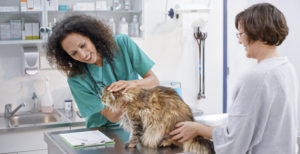
This often-overlooked piece of pet ownership can make a real difference in your pet’s quality of life. Many domesticated animals only get one set of teeth in their life!
Did you know that February is designated as National Pet Dental Health Month by the American Veterinary Medical Association? This often-overlooked piece of pet ownership can make a real difference in your pet’s quality of life. Many domesticated animals only get one set of teeth in their life! It’s up to us to care for these teeth as well as we can to ensure that our pets get the most out of them.
What Does Pet Dental Care Look Like?
Pet dentistry is remarkably similar to your own dentist appointments. Board-certified vets, vet techs, and veterinary dentists are all trained to handle necessary dental check-ups and procedures. Usually, we’ll do a visual exam of your pet’s mouth first. If we see any issues then we may feel the need to get some x-rays. If we don’t see any serious problems, then we can move forward with a thorough cleaning. Teeth cleanings for pets are basically the same as those for humans. The goal is to remove plaque and tartar and to get below the gum line to prevent oral disease. The big difference is that your pet will have to be sedated to accomplish the cleaning.
Issues Worth Mentioning
Our pets have different instincts for healing and managing pain than we do, so if you’re not an expert it can be tough to discern when there’s a real health problem going on. Here are some issues that you should absolutely bring up with a vet:
-Reduced appetite: If your pet shows no signs of GI issues, then they may not want to chew their food because it hurts.
-Swelling, bleeding, loose teeth: These are all signs of trauma to the mouth or an infection.
-Discolored teeth, bad breath: Pet breath isn’t so great, to begin with, but if you notice a really foul odor from your pet’s mouth then we want to know. The same goes for teeth that have become excessively yellowed.
Common Diagnoses
There are several issues that we actually see quite often in veterinary offices, so if you get one of these diagnoses then there’s probably no reason to panic. By following a diligent treatment plan you can likely get your pet’s dental health back in tip-top shape.
-Cysts, abscesses, infections: These can be truly excruciating for any animal, but with the proper removal and some antibiotics, the road to recovery shouldn’t be too long.
-Broken teeth: Extremely common in pets with a real sense of adventure; they will adjust and heal shortly after having any of these removed.
-Periodontal disease: You need to work closely with a vet or veterinary dentist to stay on top of this, because you don’t want it to progress and become more severe. You’ll need regular thorough cleanings, and to follow whatever at-home regimen the doctor recommends.
We Would Love the Opportunity to Care for Your Furry Friends!
Alexander Animal Hospital is a full-service animal hospital located in Severna Park, Maryland, serving the Severna Park, Pasadena, and Arnold areas. Our goal is to educate clients on their pets’ needs and understand the importance of individualized veterinary care to strengthen the human-animal bond between owners and pets.
We understand you have a choice when deciding on the care for your pets. Therefore, we strive to provide you with unparalleled services, including wellness exams, vaccines, lost pet microchip ID, dental care, surgical services, digital radiography, and in-hospital laboratory services and diagnostics. Other highlights of Alexander Animal Hospital are the separate cat and dog waiting and exam rooms and after-hours on-call emergency services.
Please look around our website and then give us a call at 410-777-8678 to set up an appointment. We’re social! Follow us on Facebook, Twitter, and Pinterest for all the latest updates!
